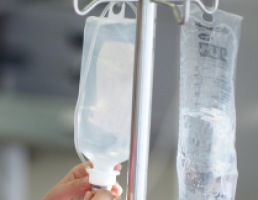
Results from a clinical trial by the ECOG-ACRIN Cancer Research Group (ECOG-ACRIN) show a striking improvement for patients who received chemotherapy before surgery to remove advanced squamous cell-type cancer of the nose or sinus.
The European Society of Medical Oncology is highlighting the trial at its ESMO Congress 2024 in Barcelona, Spain. Surgery is required for these patients but at a high physical cost.
Patients enrolled in this trial had signs that surgery would result in loss of the eye, the base of the skull bone, or both.
However, in the randomised prospective trial EA3163, patients receiving chemotherapy before surgery had a 50% chance of structure preservation.
In contrast, patients having surgery, the usual treatment, had only a 15% chance of preserving both the eye and the base of the skull bone.
The National Cancer Institute, part of the National Institutes of Health, sponsored the study.
“These results support chemotherapy before surgery as an effective intervention to improve the preservation of vital organs, bone, and tissue in patients with nasal and paranasal sinus squamous cell carcinoma,” said lead investigator Nabil F. Saba. MD, Professor and Vice Chair, Lynne and Howard Halpern Chair in Head and Neck Cancer Research, Director of the Head and Neck Oncology Program at the Winship Cancer Institute, Emory University School of Medicine, and a member of the ECOG-ACRIN Head and Neck Cancer Committee.
Providing chemotherapy before surgery has shown questionable promise for improving organ preservation in small single-institution trials.
Based on this suggestive data, some oncologists and surgeons recommend it for their patients.
However, widespread adoption has been hampered by the lack of a randomised multi-center trial showing its advantages over primary surgery in terms of organ preservation.
EA3163 was conducted to address this need.
“Because this disease is so rare, it was a bold move and significant undertaking to conduct this trial. Unlike the previously reported information on the role of chemotherapy in organ preservation, this study enrolled patients who were deemed to clearly need organ resection, and we tracked this information carefully, which allowed us to have a more objective examination as to the role of chemotherapy in organ preservation and be able to prove or disprove this approach. The EA3163 trial, therefore, provided the reliable platform to objectively compare the two approaches,” said Dr. Saba.
This prospective randomised clinical trial EA3163 (NCT03493425) aimed to enroll 82 patients with nasal and paranasal sinus squamous cell carcinoma, stage T3 and T4a (as well as select T4b).
The trial enrolled 29 patients between March 2018 and August 2023 at multiple clinical sites in the United States.
It closed in November 2023 after slow accrual. Results are being reported for 23 patients able to be evaluated.
“Despite being unable to complete the planned accrual and reach a definitive answer, the study results are striking and support the use of neoadjuvant chemotherapy as an intervention that could improve the chance of organ preservation for these patients.
We are happy to see that structural preservation, in every possible way we examined it, favours neoadjuvant chemotherapy,” said Dr. Saba.
Nose and sinus cancer is a rare disease that affects about 2,000 people in the United States each year, mostly in people aged 55 and older (American Cancer Society).
At presentation, patients typically have tumours in or near the eyes (orbit), the base of the skull bone, or both.
The nasal cavity and paranasal sinus are close to many vital nerves, blood vessels, and other structures, making surgical planning and the surgery itself difficult.
Thus, patients live with the debilitating effects of surgery and radiation for the rest of their lives.
Through study EA3163, Dr. Saba and colleagues aimed to reduce morbidity for these patients.
They also hope to improve the current 5-year survival rate, which is below 50%. Participants continue to be monitored for 2-year overall survival.
“We believe future trials will need to test whether modifying the choice of chemotherapy or adding immunotherapy could improve the chance of organ preservation,” said senior investigator Barbara A. Burtness, MD, a Anthony N. Brady professor of medicine and Chief Translational Research Officer at Yale Cancer Center, chair of the ECOG-ACRIN Head and Neck Committee, and chair of the ECOG-ACRIN Task Force on Advancement for Women.
Patients in the control arm received surgery followed by radiation therapy (60 Gy).
Patients in the experimental arm received three cycles of chemotherapy followed by surgery and radiation therapy (66 Gy).
The chemotherapy consisted of docetaxel at 75 mg/m2 and cisplatin at 75 mg/m2.
However, patients could receive carboplatin (40 mg/m2) instead of cisplatin if the treating physician deemed it necessary.
These doses are considered very acceptable by National Comprehensive Cancer Network clinical practice guidelines.
Dr. Saba will present the results on Saturday, September 14, 2024, 8:30-10:00 AM CEST, in Barcelona. Abstract 850MO is posted on the ESMO Congress 2024 website. The title is: Phase II randomised trial of chemotherapy followed by surgery and PORT versus surgery and PORT for organ preservation of T3 and T4a (selected T4b) sinonasal squamous cell carcinoma (SNC): A trial of the ECOG-ACRIN Cancer Research Group (EA3163).
Source: ECOG-ACRIN Cancer Research Group
We are an independent charity and are not backed by a large company or society. We raise every penny ourselves to improve the standards of cancer care through education. You can help us continue our work to address inequalities in cancer care by making a donation.
Any donation, however small, contributes directly towards the costs of creating and sharing free oncology education.
Together we can get better outcomes for patients by tackling global inequalities in access to the results of cancer research.
Thank you for your support.